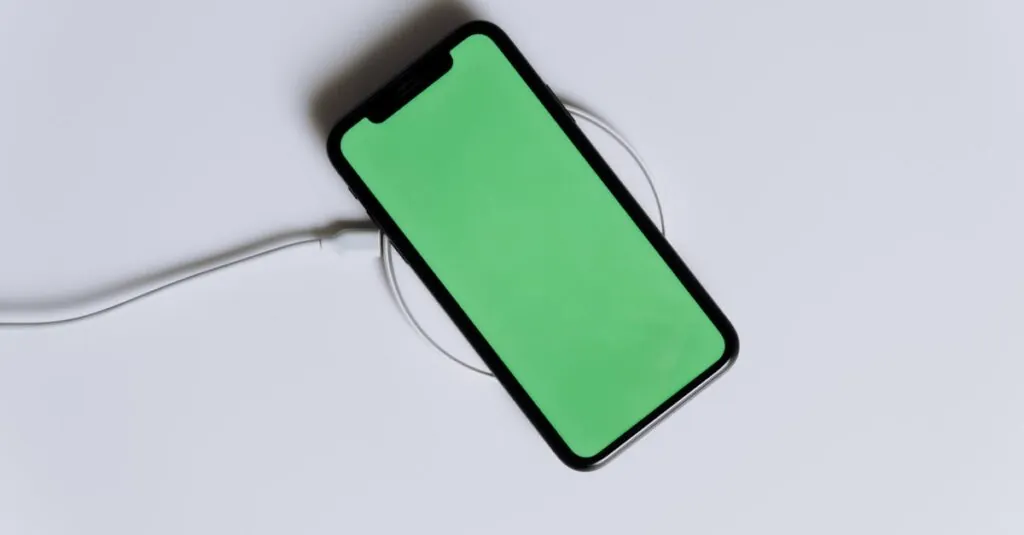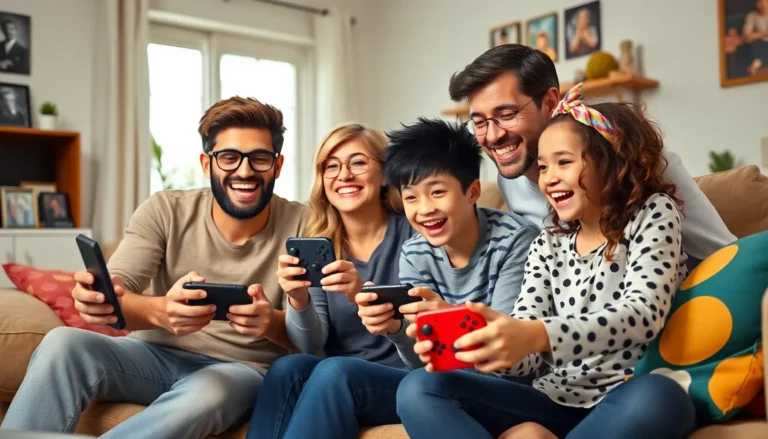Table of Contents
ToggleWhen it comes to charging the iPhone 11, it’s not just about plugging in any old charger and hoping for the best. This sleek device has its own set of preferences, and knowing what it needs can save users from a battery disaster. Imagine reaching for your charger only to realize it’s as useful as a chocolate teapot.
What Kind of Charger Does iPhone 11 Use
The iPhone 11 uses a Lightning connector for charging. Users can connect this Lightning cable to various power sources, including wall adapters and USB ports. Apple’s official charger for the iPhone 11 consists of a 5W adapter or a compatible USB-C power adapter.
Fast charging is available when using a USB-C to Lightning cable and a compatible 18W adapter or higher. This option allows users to recharge their devices from 0% to about 50% in 30 minutes. Third-party chargers may also be used, but they must comply with USB-IF (USB Implementers Forum) standards to ensure safety and compatibility.
Charging accessories should be certified by Apple to avoid any potential issues. Certification, indicated by the MFi (Made for iPhone) mark, ensures that third-party manufacturers meet Apple’s performance and safety requirements. Avoid using low-quality or unverified chargers, as they can pose risks like overheating or battery damage.
It’s crucial to consider the charging speed and efficiency when choosing a charger. The higher the wattage of the adapter, the faster the device charges. However, using an overly powerful charger won’t negatively affect the iPhone 11, as the device regulates the power it receives.
Overall, to ensure optimal performance and safety, using Apple’s original or certified chargers is advisable. By prioritizing compatible charging solutions, users can extend the lifespan of their iPhone 11’s battery while enhancing their charging experience.
Charger Type Overview
The iPhone 11 uses specific charger types for optimal functionality and safety. Understanding these types helps users make informed choices.
Lightning Connector
The iPhone 11 features a Lightning connector for charging. This connector supports different power sources, including wall adapters and USB ports. Users benefit from the wide compatibility offered by the Lightning connector. Apple provides a 5W adapter that fits this connector, ensuring basic charging needs are met. Fast charging requires a USB-C to Lightning cable paired with an 18W adapter or higher. Utilizing third-party options is possible, but they should comply with USB-IF standards and carry the MFi certification.
USB-C Compatibility
USB-C compatibility enhances the iPhone 11’s charging options. Many modern chargers utilize USB-C for efficient power delivery. Users can charge their iPhone 11 faster with a USB-C power adapter, provided it meets or exceeds 18W. Apple’s emphasis on quality reflects in their recommendations for chargers that adhere to safety standards. The device intelligently regulates the power it receives, preventing any potential overload. Third-party USB-C chargers also can provide effective charging as long as they meet Apple’s guidelines.
Charging Options for iPhone 11
The iPhone 11 offers multiple charging options to meet users’ needs. Exploring these choices ensures optimal device performance and battery health.
Wall Chargers
Wall chargers remain a primary charging solution for the iPhone 11. Users can select Apple’s official 5W adapter for standard charging at home or the office. For faster charging, using an 18W USB-C power adapter provides efficient power delivery. A USB-C to Lightning cable can increase charging speed significantly. Certified third-party wall chargers can also be suitable as long as they comply with USB-IF standards and carry the MFi mark. Prioritizing quality benefits device safety and battery longevity.
Wireless Charging
Many prefer wireless charging for its convenience. The iPhone 11 supports Qi wireless charging, making it compatible with various wireless charging pads. With this feature, placing the device on a compatible pad activates charging without connection to a cable. The maximum wireless charging speed reaches 7.5W, offering a balance between form and function. It’s important to choose reputable charging pads to ensure efficiency and safety, as subpar options can lead to overheating. Adopting this charging method complements traditional options and enhances user experience.
Charging Speed and Performance
Charging speed and performance are crucial for optimizing the iPhone 11 experience. The right charger can significantly impact how quickly the device charges without compromising battery health.
Fast Charging Capabilities
Fast charging enables users to power the iPhone 11 more quickly than standard methods. With an 18W adapter or higher and a USB-C to Lightning cable, this device can charge up to 50% in approximately 30 minutes. The iPhone 11 intelligently manages power intake, ensuring safety during fast charging sessions. It’s essential to note that only certified chargers provide optimal results without risking overheating or battery damage. Third-party chargers carrying the MFi mark can also support this fast charging feature.
Comparing Charger Speeds
Charger speeds for the iPhone 11 vary significantly based on the adapter type. The standard 5W adapter offers a slower charging experience, suitable for overnight charging or casual use. In contrast, a higher-powered charger, like an 18W or 20W adapter, delivers faster results. Wireless charging through compliant Qi pads peaks at 7.5W, serving as a convenient though slower alternative. Users should consider their charging habits to choose the most effective option. Selecting a charger that meets USB-IF standards ensures efficiency and safety during each charging session.
Accessories and Recommendations
When choosing accessories for the iPhone 11, select chargers that meet its specifications. Apple’s original charging options, including the 5W adapter and the 18W USB-C power adapter, suit various needs. Fast charging capabilities shine when using an 18W adapter with a USB-C to Lightning cable, allowing the device to reach up to 50% charge in about 30 minutes.
Third-party chargers work but ensure they carry the MFi certification. Not all third-party options provide the same safety and efficiency, so identifying USB-IF certification is crucial. Certified chargers, indicated by the MFi marker, prevent overheating and battery damage.
Wireless charging enhances convenience for everyday use. Placing the iPhone 11 on a compatible Qi charging pad achieves a maximum charging speed of 7.5W. Users benefit from this technology in situations where cables might be cumbersome.
Consider purchasing durable cables alongside chargers. Lightning cables from reputable brands ensure longevity and reliability in power delivery. Investing in extra adapters for travel provides flexibility and peace of mind.
Additionally, a charging dock may serve to keep devices organized. Using a dock allows simultaneous charging of multiple devices, such as the iPhone 11 and AirPods, offering a streamlined solution for tech enthusiasts.
Pay attention to charger specifications to optimize device performance. Charging habits influence battery health, so utilizing high-quality accessories safeguards against potential issues. Prioritizing certified products leads to a better overall experience for iPhone 11 users.
Choosing the right charger for the iPhone 11 is essential for maintaining battery health and ensuring efficient charging. Users should stick to Apple’s official chargers or certified third-party options that meet USB-IF standards. This approach minimizes risks associated with overheating and battery damage.
Fast charging capabilities offer significant advantages for those needing quick power boosts, while wireless charging provides a convenient alternative. By prioritizing high-quality charging accessories and understanding their device’s needs, iPhone 11 users can enhance their overall experience and longevity of their device’s battery life.







